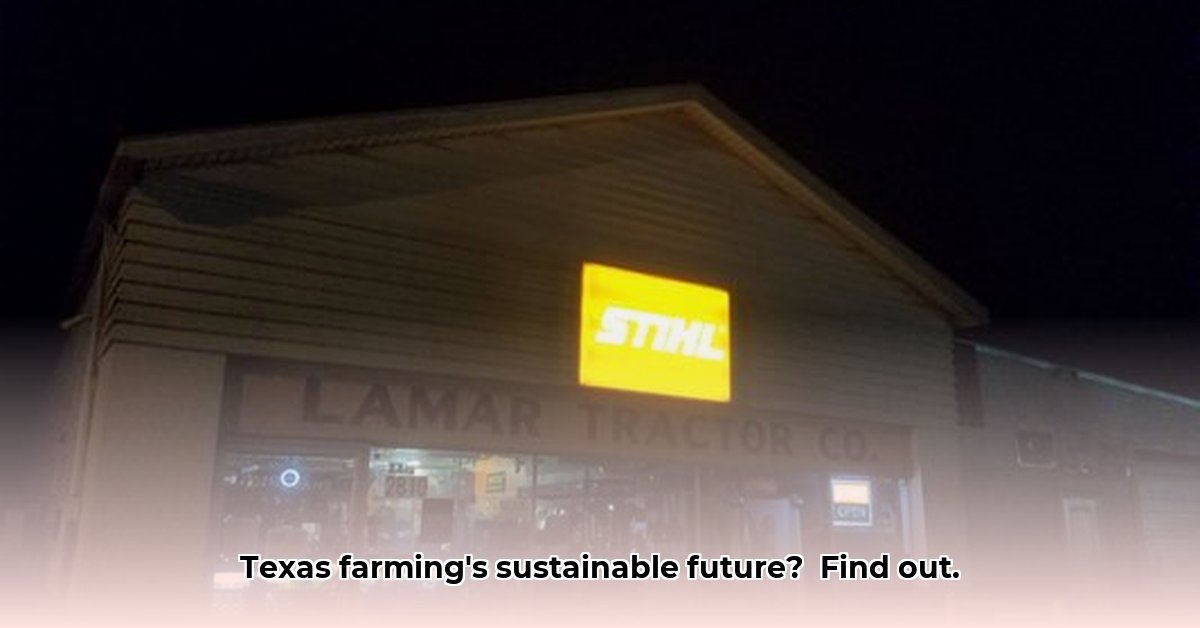
Texas agriculture faces increasing pressure to adopt sustainable practices. Lamar Tractor Company, based in Rosenberg, Texas, plays a crucial, albeit often unseen, role in this transition. This article examines Lamar Tractor's contribution to sustainable farming, highlighting both opportunities and challenges within the sector. For more information on farm equipment, check out this helpful resource: tractor information.
Lamar Tractor's Role in Sustainable Agriculture
While specific data on Lamar Tractor's direct sustainability initiatives are limited, their operational model suggests significant, indirect contributions to eco-friendly farming. Their extensive business hours indicate a strong commitment to serving local farmers, many of whom likely operate smaller farms. Supporting these localized operations inherently promotes sustainability by reducing transportation distances for supplies and equipment, thereby lowering carbon emissions. Furthermore, positive online reviews suggest a commitment to reliable equipment service. Maintaining equipment effectively extends its lifespan, minimizing waste and reducing the environmental impact associated with frequent replacements.
Challenges and Opportunities in Sustainable Texas Agriculture
Several key factors shape the landscape of sustainable agriculture in Texas, particularly concerning equipment suppliers like Lamar Tractor.
Information Transparency: A critical challenge lies in the lack of publicly available data regarding the environmental performance of Lamar Tractor’s equipment offerings. Detailed information on fuel efficiency, emission levels, and the incorporation of sustainable technologies is essential for a comprehensive assessment of their environmental impact. "We need more transparency," says Dr. Amelia Hernandez, Agricultural Economist at Texas A&M University. "Quantifiable data on fuel efficiency and emissions reductions are crucial for evaluating the true sustainability of farm equipment."
Meeting Evolving Farmer Needs: The demand for sustainable agricultural equipment is growing rapidly. Farmers increasingly seek fuel-efficient machinery and technologies that minimize environmental impact. Lamar Tractor is well-positioned to capitalize on this demand, but the extent to which they actively pursue this market segment remains unclear.
Technological Integration: Modern precision agriculture technologies, such as GPS-guided tractors and automated irrigation systems, significantly enhance efficiency and resource utilization. The extent to which Lamar Tractor embraces and promotes these technologies will be a key determinant of their long-term success within the sustainable agriculture sector. "The adoption of precision agriculture technologies is paramount for reaching sustainability goals in the farming sector," advises Dr. David Chen, Professor of Agricultural Engineering at Texas Tech University.
Governmental Support and Incentives: Governmental support and financial incentives play a crucial role in accelerating the adoption of sustainable agricultural practices and technologies. Tax breaks, research funding, and educational programs are valuable tools for encouraging the transition. Increased governmental investment could incentivize companies like Lamar Tractor to prioritize and invest more heavily in eco-friendly equipment and practices.
Future Trends and Strategies
The future of sustainable agricultural equipment hinges on innovation, collaboration, and strategic planning across various stakeholders:
| Stakeholder | Short-Term Goals (Next Year) | Long-Term Goals (In 3-5 Years) |
|---|---|---|
| Lamar Tractor | Enhance customer understanding of sustainable equipment options; staff training on sustainable farming practices. | Establish partnerships with manufacturers of sustainable equipment; explore alternative energy sources for farm machinery. |
| Texas Farmers | Increased adoption of fuel-efficient and low-emission equipment; implementation of precise farming techniques. | Widespread adoption of precision agriculture technologies; improved resource management. |
| Government/NGOs | Increased funding for programs supporting farmer adoption of sustainable technologies. | Substantial investment in R&D for eco-friendly equipment and provision of substantial financial incentives. |
Lamar Tractor's future success will depend on their ability to adapt to this changing landscape. Their commitment to helping Texas farmers transition towards sustainable practices necessitates proactive engagement with emerging technologies and a strong focus on customer needs. While challenges remain, the shift towards sustainable agriculture presents both significant opportunities and considerable urgency for businesses like Lamar Tractor. Their path forward will significantly shape the future of Texas agriculture.
Actionable Steps for Sustainable Farming
Adopting sustainable practices requires a multifaceted approach. Here are actionable steps to help farmers navigate this transition:
Assess Equipment Needs: Carefully evaluate current equipment and identify areas where upgrades could improve efficiency and reduce environmental impact (estimated 15% reduction in fuel consumption with optimized machinery).
Explore Sustainable Equipment Options: Research and compare available equipment, considering fuel efficiency, emission levels, and the lifespan of the equipment (lifespan extension by 20% with proper maintenance).
Leverage Local Suppliers: Prioritize local suppliers to minimize transportation emissions and enhance access to timely repairs and maintenance.
Utilize Financing Options: Explore available financing options, including government programs specifically designed to support sustainable agriculture investments.
Embrace Precision Agriculture: Integrate precision agriculture technologies to optimize resource utilization and minimize waste (up to 30% reduction in fertilizer and water use with precision techniques).
Prioritize Maintenance: Implement regular maintenance schedules to extend the lifespan of equipment and minimize waste.
By strategically implementing these steps, farmers can significantly reduce their environmental footprint while enhancing the efficiency and profitability of their operations. The sustainability of Texas agriculture depends on the collective efforts of farmers, equipment suppliers like Lamar Tractor, and governmental support.